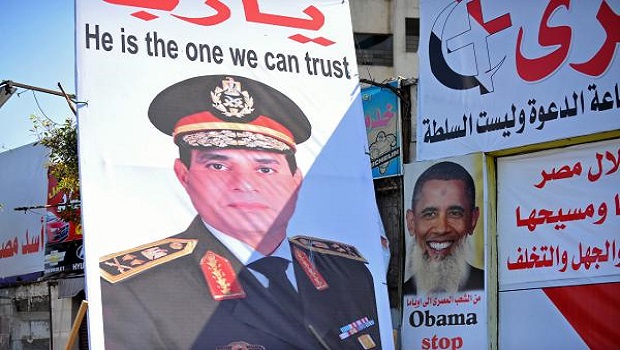The current reality is that all Egyptian political forces are in a state of decline. We can excuse the Egyptian military for its interference in politics after Hosni Mubarak’s abdication, largely because popular opposition to political Islam was in a position of weakness at the time. The military’s intervention was necessary in the immediate aftermath of the fall of Mubarak’s dynasty.
The Supreme Council of the Armed Forces took up the administration of national affairs the moment Mubarak left office. For a long time, it was not apparent that civilian political forces would be able to reach a common purpose. This encouraged the military to remain in power, rather than fulfill its duty under the law: defending the nation’s independence and territorial integrity.
It seemed that the military’s only option was an alliance with the only powerful political force in the nation, which at the time was the Muslim Brotherhood. This encouraged the Egyptian electorate to continue on an Islamic path, making the Salafist Al-Nour Party the second largest faction after the Freedom and Justice Party, the Muslim Brotherhood’s political arm.
As far as the civilian political class was concerned, the marriage of the military and the Muslim Brotherhood was a mistake for the military. It is true that the military allied with the Brotherhood in order to obtain political cover while it restored stability to the country, but it is also true that this encouraged violent political movements to cover their tracks. This triggered a panic in the Egyptian political sphere. We saw the ousted president, Mohamed Mursi, embrace and accept a leading role in the violence in full view of the people. This is a leader who denied that he renounced violence during audits of prisons in the Mubarak era.
It was also a mistake on the Brotherhood’s part, because civilian political forces saw this alliance as an attempt to undermine the community.
The Brotherhood’s alliance with civilian political forces was possible after Mubarak because the military did not want anything more than a stable political system in which it was guaranteed a hefty slice of the pie.
In a nation left prey to political turmoil by the uprising and the consequent breakdown of security, it was inevitable that cracks would appear. They started with Mursi’s ouster and continued through the bloody crackdowns on sit-ins and demonstrations and the emergence of new violence.
The truth is, the divide weakened everyone, though a faction here or there maintained a degree of cohesion. Because civilian political forces were unable to stand behind political decisions as was necessary after Mubarak, they are still unable to unite behind a presidential candidate, even though the system that alienated them no longer exists.
The new reality is that political forces of all stripes are in decline.
The civilian political class supported the army’s mobilization against the Brotherhood, but now it fears that its situation will become vulnerable the moment the army no longer considers it a useful ally. Civilian and Islamic political forces have thus found themselves in comparable positions of weakness.
It is natural that Egypt—given her heritage as the oldest nation in history and the oldest civilization in the world—can surprise people when the nation heads in a new direction, but the facts on the ground suggest that civilian political forces are too fractured and weak to agree upon anything. This is a prominent feature of the current political situation in this great nation.
The counterpoint to this article can be read here.
